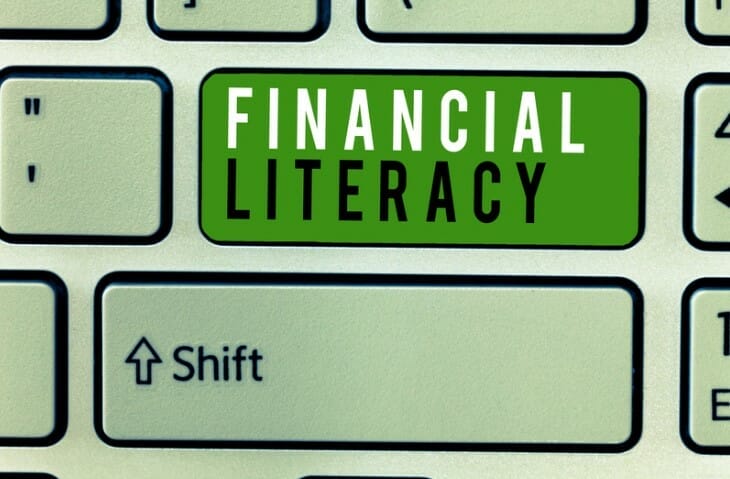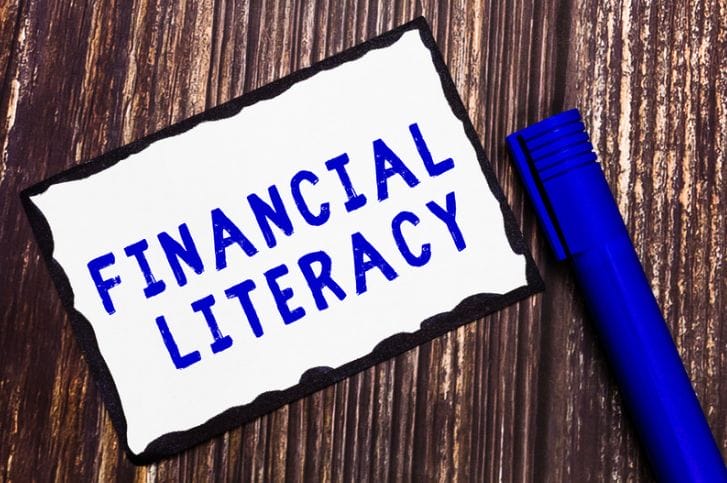In a world where there are so many problems, if we understood the importance of financial literacy for youth, so many could be solved.
It wasn’t that long ago when graduating from high school and going straight to work was the norm. My grandparents were married at 18, had their first child at 20, and have now been married for 65 years. Then in the 1990s and 2000s, the “normal” changed to everyone at least attempting to go to college and taking their time to find their forever person.
While people are still taking their time on getting married and starting families, the idea of going back to trade schools is becoming more and more popular. It’s a strange thing to say, but the U.S. is becoming over-educated and there is a real shortage of employees for trade jobs.
I went to college, got a degree, and have a job that requires a degree. But I don’t always get the stigma on some of the trade jobs. My neighbor owns a bigger and nicer house than me and he is a plumber. He started working for a business right out of high school and now manages every single employee at the company, making well over six figures with a high school degree.
And while it may not be the most desirable job in the world, the one field that is really hurting the most right now by worker shortages is the delivery and truck driver business. Not only are people shifting their habits to buying online, which has created a huge demand for package deliveries, but it also appears to be a job that was far more popular 35 years ago than right now.
If you went and got your CDL right now, you could be home every single night, work 40 to 50 hours a week and make over $100,000 a year. Not that drivers don’t deserve to be paid, but I can tell you they have a lot less stress making deliveries than I do at my job and are making more!
So, you are likely asking, “why this rant?” As the economy changes and college becomes more expensive and trade jobs continue to pay high dollars, you’re going to start seeing a shift in what high school kids do after graduation.
With fewer and fewer kids going to college, the importance of financial literacy for youth becomes that much more important. With four fewer years of schooling, it becomes that much more important for children to learn about the value of money at a younger age.
You can make the argument that some just get it more than others when it comes to understanding money, but you must remember that this can be a generational issue. How can you expect your children to understand finances when you yourself were never taught?
Trust me, this isn’t a knock if you consider yourself someone who struggles with financial decisions. Would I expect my son to do something if I didn’t teach him first? Absolutely not, I’m just reiterating my point that we can’t overlook the importance of financial literacy for youth.
No matter your political belief, the Florida law that now requires high school students to take a course on personal finance before graduation is one that should be enforced in all states.
I’ll never forget in high school, my parents made me take a typing class. I thought that was the silliest thing in the world and I hated the teacher. Looking back, for my first internship, I had to take a typing test as a part of the interview. I wouldn’t have done nearly as well without the course I was forced to take in high school.
Don’t get me wrong, some still won’t take the course seriously and it will be a waste of time. But even if one child in each class from the state of Florida learns something in that class, it could legitimately change their life.
Far too often we spend time talking about the importance of going to college, getting a job, and starting to plan for your retirement. When really, the importance of financial literacy for youth should be one of the most important topics we talk about.

This isn’t a course that will be overly difficult, but it will be more of an informative class. Teachers will discuss different types of bank accounts, how to manage a checkbook, and the basic principles of money management, as well as understanding how a credit card and your credit score all work.
Not only will the course cover personal finance, but students will also be taught the basics of a loan application, how to file their taxes, and the basics of how insurance works and why it is important.
To some of us, this seems like everyday life necessities, but there are some people who have never gotten the opportunity to learn the basics. If you want to be financially stable in this country and educate the population, you must start at the bottom and build your way up.
To this point, we have talked about the importance of financial literacy for youth and what Florida is doing to help. Now I want to talk about why it’s so important, and some of the negatives that can happen if young adults don’t start out on the right foot.
Staying Out of the Hole:
When I was 19 years old, I went to college. Luckily, I didn’t have any money at that point in my life, and my parents would have yelled at me if I wanted to do something that wasn’t exactly smart.
However, I had plenty of friends that graduated high school, went straight to work, got their first check, and bought a $60,000 truck because they still lived with their parents. Don’t get me wrong, if you want to live at home and your parents are still happy to have you, this isn’t a horrible strategy.
But if you are looking for financial freedom and want to get out on your own, you’ve already put yourself in a huge hole with a truck payment that could be as much as $800 a month. My friend didn’t understand the cost to insure a truck like that each month; he didn’t understand that his mom wouldn’t be giving him lunch money every day, and the costs just added up.
In the example above, the guy I knew who did this ended up selling the truck after a year and lost almost $20,000 off the purchase price – a prime example of starting in a hole that is difficult to get out of. Far too often folks get used to living check to check at age 19 and it just becomes the norm for them.
The exact same thing can happen with a credit card if you get one and don’t understand how to properly use it. Often times kids who are 18 or 19 years old can get approved for a credit card because of something their parents had been paying for them for years. I know when I was 18, I was approved (for a low limit) card because I had my own Verizon bill that I had kept current.
I want to say the max was only $1,500, but you can do some real damage with that over a few months if you start only making the minimum payments. I will never forget when I got my first credit card bill and saw the “minimum payment” line. I called my dad and asked if that was all I needed to pay. Remember, some 18-year-old kids don’t have anyone to call.
Far too often young people in their early 20s have already racked up so much credit card debt that they feel there is no light at the end of the tunnel and even end up filing for bankruptcy before age 30. A simple course that just teaches folks to not spend more than they make could really go a long way.
TV has ruined some people into thinking they can just buy anything they want with no consequences, and honestly, I can’t blame them. The importance of financial literacy for our youth can’t be overlooked, and if we can get everyone to start out clean and not in a huge hole, that can lead to much more success.
Create Bad Habits:
In the above section, we discussed that starting off in a financial hole can lead to a lifetime of bad decisions and feeling like you can never get your head above water. Tied closely to that are the bad habits that can be created if you haven’t had the proper financial training.
And shockingly enough (I joke), these bad habits are what will lead you into a hole. So, what are the bad habits? The first one, and likely the biggest, is overspending. If you haven’t had the proper training or education on your finances, it’s easy to overspend.
Honestly, it doesn’t even always have to be on silly materialistic items. Someone who is 18 or 19 and on their own for the first time just may not understand how expensive life can be. Maybe they haven’t paid for utilities, or insurance, or planned for taxes.
I can’t stress the importance of financial literacy for youth enough. Showing students how to create a simple budget could give them the lifelong skills to understand spending. And a class that shows the “hidden expenses” as an adult can keep them from creating the bad financial habits that can hinder them their entire life.
Someone with lesser financial knowledge sees a friend or co-worker succeeding and they don’t understand how this can also lead to bad decisions. People can often get into risky investments they don’t understand or even begin to gamble to keep up with others they know.
Just like smoking is a bad habit and can lead to a million bad things, financial bad habits can have the exact same effect.

Give Young People the Power:
Why am I stressing the importance of financial literacy for youth today? Not only are you giving them the knowledge to survive and thrive in life, but you are also giving them the power to succeed. It sounds a bit cliché to say knowledge is power, but it really is.
When I was 19 years old, I didn’t know what a 401(K) plan was, or how to open a 529 college savings account. I barely understood what a trading account was, and I only did because of a college course I took.
We must give these college graduates the knowledge of planning for their life. Kids need to understand the different options they have available to grow their money and plan for retirement.
A good friend of mine didn’t go to college and started working at a factory right out of school. He did okay, but about five years later he got promoted to a great job. He was telling me about the raise he got and all the extra benefits.
I then asked what his retirement program looked like. He said they would match up to six percent, but he wasn’t doing it because he wanted extra pay. My first thought was to slap him for being so silly, but he had no idea what that even meant. He just thought he was losing six percent of his pay.
Once I explained where the money went, what the company match was, and that he wouldn’t just lose that money if he changed jobs, he quickly realized how silly he was being. It was a legitimate five-minute conversation that could allow him to retire at age 60 vs. having to work forever because he didn’t save any money.
Being Better Prepared:
Not only does giving financial knowledge to young folks give them power, but it will also help them be better prepared to handle the good things in life and also to be better equipped to handle the negative.
If you are unprepared and uneducated in your finances and a lot of difficult decisions that all require a substantial amount of money pop up, it is easy to panic and makes bad choices. If you better understand your financial situation and how to overcome difficult scenarios, you will have the ability to remain calm and make better decisions.
Teaching financial literacy at a young age can help keep us from being in debt our entire lives. It empowers you to understand your debt to income, as well as invest to create further wealth.
Often times when there is a problem, we don’t dive deep enough to truly solve it. By pushing the importance of financial literacy for youth all across the country, we can create a world where many are more financially stable.
Related posts:
- Useful Tricks to Form Good Money Habits into Natural Decisions One thing is for certain, there are good money habits and there are bad. It seems like everyone has at least one bad habit (me...
- Best Investment Plans to Consider for Your Children’s Future [Pros and Cons] There are many different options including 529 college savings accounts, a simple stock account for your child, or a standard savings account. The short answer,...
- MYTH BUSTED! Money IS Important for Happiness One thing that I always heard as a kid was that “money can’t buy happiness” but the older I’ve grown, I really think I disagree...
- You Will Fail Trying to Get Rich Quick. I Promise. One of the biggest mistakes that I see with new investors is that they start off with a mindset that they can get rich quick. ...

